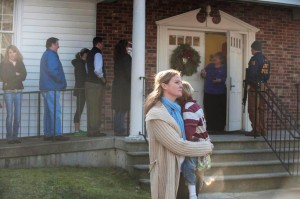I have an 8-year-old son and an 11-year-old daughter. On Friday, like parents across the country, I was shaken. I spent part of the day reading tips about how to talk to children about "scary news."
Friday afternoon, my son went to a birthday party. I figured he would not hear anything about the shootings. But it was my daughter I worried about. She watches ESPN religiously after school, and I knew there would be some mention of the tragedy. I wanted to be the one who told her about what had happened.
By the time I reached her, I was too late; she'd already heard. But she seemed oddly unaffected, leaving me conflicted. I was glad she wasn't worried, but concerned that she seemed so unmoved.
Then I caught KJ Dell-Antonia's blog yesterday in the New York Times Motherlode column.
First, Dell-Antonia argued for saying nothing, especially to younger children. After all, she wrote, "A child whose television comes from Disney and whose primary use of a mobile device involves throwing birds at pigs may not be inundated with information in the ways we fear."
